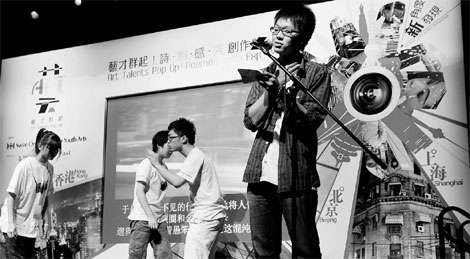Teenager poetry contest unlock huge potential
 |
|
High school students from Beijing, Shanghai and Hong Kong take part in an education program called "Art Talents Pop Up! Poemography Expo", which combines poetry and photography. [China Daily] |
Students share their take on the pressing issues facing society at a special workshop on poetry and photography.
"A fierce hammer stands ready to attack the enemy. Bang! The enemy strikes back with a Gatling gun. Brightness or darkness, triumph or failure, no one knows."
Shan Tianyi scrawls these random thoughts in his notebook, after looking at three photographs presented by his teammates. Each of them is taken from a different perspective and purports to show a different part of an unknown object.
The last photo finally shows the object to be a hair dryer.
"Writing a poem is much harder than taking a picture. This whole exercise has really stimulated my imagination," Shan says.
The 17-year-old high school student was taking part in a poetry workshop, along with dozens of other students from Beijing, Shanghai and Hong Kong. Part of the "Art Talents Pop Up! Poemography Expo", this youth education program combines poetry and photography to stunning effect.
Organized by the Swire Organization for Youth Arts, it aims to help youth realize their full potential.
About 420 junior and senior high school participants from three cities submitted their poems and photographic works on "city faces" this year. Nearly 90 finalists gathered in Hong Kong in mid August, to compete for the top five prizes.
Students were divided into 15 teams of five or six selected from all three cities. They had to pick an idea for their final presentations, select four photos from their original entries and compose a new Chinese or English poem to tie in with these photos.
He Yini, 16, from the Beijing Foreign Language School, one of the finalists, chose a photo that shows an elderly couple sitting by a lake in Yuanmingyuan, the Old Summer Palace.
"I went to many scenic spots in Beijing that even I, as a native, had seldom visited. I talked with those elderly residents who still enjoy living in the disappearing courtyards and hutong. I tried to capture some leisure moments of this fast-paced city life," she says.
She and her new team presented the selected theme by zeroing in on the callousness and indifference of urban life. Their work, titled Over-speeding City and Earthquake, mulls solutions to speeding and ways to find happiness. The team won both the Outstanding Award for English Poem and the Platinum Award.
Many other works expressed similar concerns about the conflict between a highly-developed society and people's search for spiritual comfort. "Their poems and photos are better than I expected. I see no prejudice in their minds. The youth are not just sensitive to but also insightful on social issues," Liao Weitang, a Hong Kong-based poemographic artist and judge, says.
"The only regret is their works lack literary merit, a reflection perhaps on the fact that poetry is no longer as popular among the younger generation as it was in the 1980s," Wang Yin, another judge and poet from Shanghai, says.
Besides taking on technical and artistic challenges, students also learned teamwork and building mutual trust over the five days of the workshop.
Even though his acting in the final presentation won loud applause, Hou Bai Hanying from Shanghai expresses dissatisfaction with his team's performance. "I am not happy with either the photos we presented or the poem the girls wrote. I disagreed with the idea from the beginning, but no one wanted to listen to me," he says.
Xu Deyi, a fine arts teacher from Beijing No 80 High School whose students also contested, says such disagreements were common.
"Today's students, being the only child of their families, are all very feisty. The program helped them learn the art of persuasion. That, in turn, will help them adapt to college life - where they have to share rooms and write papers and have no parents or teachers around to help - more quickly."
The winning works will soon be exhibited in Hong Kong before moving to Beijing and Shanghai in November.
 0
0 







Go to Forum >>0 Comments